If you’re considering adding a new canine companion to your family, you might find yourself torn between a German Shorthaired Pointer and a Weimaraner.
Both breeds are known for their athleticism, intelligence, and striking good looks. But which one is the perfect fit for your lifestyle? While they share some similarities, these breeds have distinct personalities and needs that can make a big difference in your day-to-day life.
Before you make your decision, it’s crucial to understand the unique traits and requirements of each breed. Let’s explore what sets these two apart and help you determine which one might be your ideal four-legged friend.
Visual Differences of German Shorthaired Pointer & Weimaraner
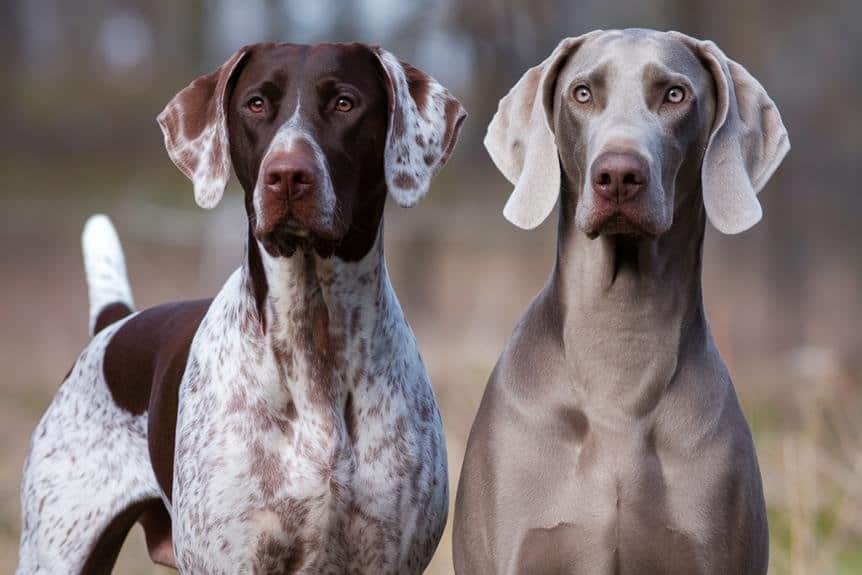
When comparing the German Shorthaired Pointer (GSP) and the Weimaraner, you’ll immediately notice their distinct visual differences. The GSP sports a liver or liver and white coat, while the Weimaraner boasts a unique silver-gray coat that’s hard to miss.
Size-wise, you’ll find the Weimaraner to be the larger of the two. It stands taller at 23-27 inches and weighs between 55-90 pounds.
The GSP, on the other hand, is slightly smaller, measuring 21-25 inches in height and tipping the scales at 45-70 pounds.
Both breeds have short coats that are a breeze to maintain, but the GSP tends to shed a bit more than its Weimaraner cousin.
You’ll also notice differences in their facial features. The GSP has expressive eyes and ears that give it a friendly, approachable look.
In contrast, the Weimaraner’s noble head shape contributes to its more refined and elegant appearance.
A Quick Overview – German Shorthaired Pointer & Weimaraner
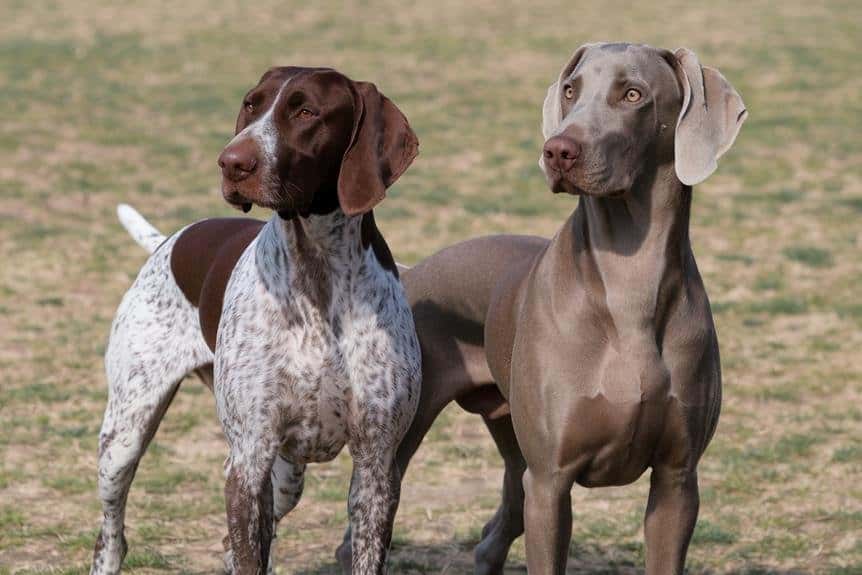
| Feature | German Shorthaired Pointer | Weimaraner |
|---|---|---|
| Average height (adult): | 21-25 inches | 23-27 inches |
| Average weight (adult): | 45-70 pounds | 55-90 pounds |
| Lifespan: | 12-14 years | 10-12 years |
| Maintenance Level: | Medium. Regular grooming required due to shedding. | Medium. Regular grooming needed for their short coat. |
| Temperament: | Outgoing, sociable, eager to please. | Independent, protective, more reserved. |
| Exercise: | High. Requires plenty of physical activity and mental stimulation. | High. Needs structured exercise to channel energy. |
| Trainability: | High. Responds well to training and eager to learn. | Moderate. Requires consistent training due to independent nature. |
| Family-friendly: | Yes, adapts well to various family situations. | Yes, but may need supervision around young children due to their energy level. |
Which Breed Is Right for You?
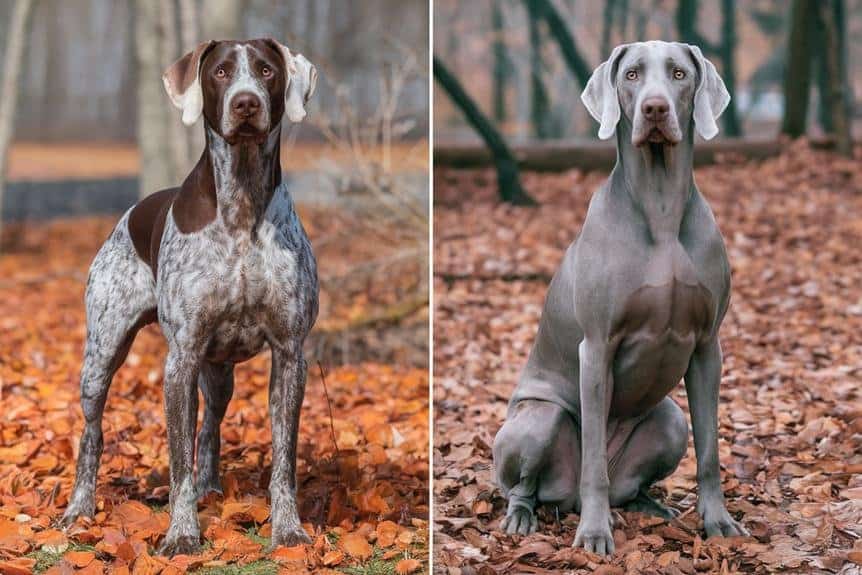
Choosing between a German Shorthaired Pointer and a Weimaraner depends largely on your lifestyle, experience with dogs, and specific needs. Both breeds make excellent companions, but they’ve distinct characteristics that might suit different families better. Like Golden Retrievers and Cockers, these breeds have different energy levels and grooming requirements, which should be considered when making your choice.
If you’re an active family looking for a versatile and sociable dog, the German Shorthaired Pointer (GSP) might be your best bet. They’re known for their friendly nature and adaptability, making them great family dogs. GSPs are also easier to train, which is perfect if you’re a first-time dog owner.
On the other hand, if you’re an experienced dog owner with a large backyard and plenty of time for exercise, a Weimaraner could be a good fit. They’re loyal and protective, with a strong prey drive that makes them excellent hunting companions. However, they can be more challenging to train and may bond closely with one person.
Consider your hunting goals, too. GSPs are versatile hunters, while Weimaraners excel at larger game. Both breeds need consistent training and socialization, but with the right approach, either can become a loving and devoted family member.
German Shorthaired Pointer & Weimaraner Puppy Price

Once you’ve decided which breed suits your lifestyle, it’s time to consider the financial aspect of bringing home a new puppy. When it comes to puppy price, both German Shorthaired Pointers (GSPs) and Weimaraners can have a significant impact on your wallet.
For a GSP puppy, you’re looking at a range of $500 to $1,500. Weimaraners tend to be a bit pricier, with costs between $800 and $2,000.
But don’t let these numbers scare you off! Remember, breeder quality plays a huge role in determining the price.
Top-notch breeders might charge more, but they often provide healthier, well-socialized puppies. For championship bloodlines, expect to pay around $1,200 for a GSP and $1,500 for a Weimaraner. These higher prices can be worth it in the long run.
Don’t forget to factor in additional costs like health screenings and vaccinations. These can add a few hundred to over a thousand dollars to your initial investment.
Whichever breed you choose, do your homework on breeders. A reputable breeder might cost more upfront but can save you heartache (and vet bills) down the road.
German Shorthaired Pointer & Weimaraner History
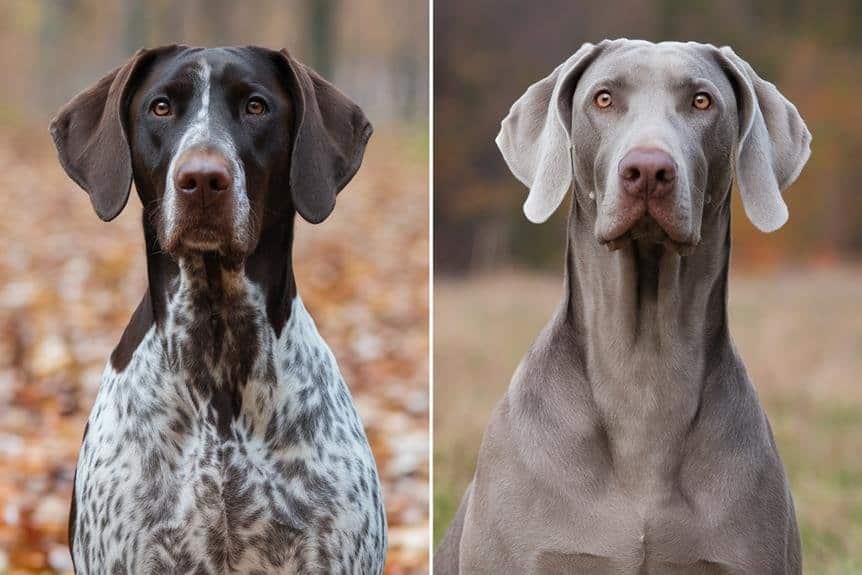
From their shared German roots to their esteemed status as hunting companions, the German Shorthaired Pointer (GSP) and Weimaraner have rich histories that intertwine in 19th century Germany.
Both breeds were developed by German aristocrats who sought to create the perfect hunting dogs. You’ll find that these intelligent and hardworking breeds have made quite a name for themselves over the years.
The GSP was bred to be a jack-of-all-trades in the hunting world. They’re experts at tracking, pointing, and retrieving game.
On the other hand, Weimaraners were specifically designed for hunting large game. Talk about a big job for a dog!
Through careful crossbreeding, these hunters created two distinct breeds with exceptional skills. The GSP’s versatility made it a favorite among hunters who needed an all-around performer.
Meanwhile, the Weimaraner’s prowess in tackling big game earned it a special place in the hearts of those who preferred larger quarry.
Today, both breeds continue to showcase their hunting heritage. Their intelligence and strong work ethic make them not just great hunting partners, but also wonderful family companions.
Who knew these German aristocrats would create such enduring legacies?
German Shorthaired Pointer Overview
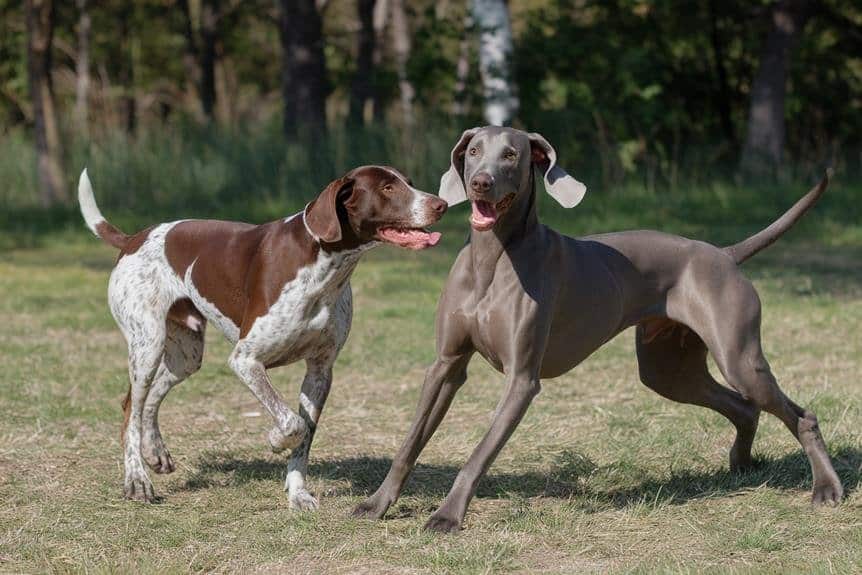
When considering a German Shorthaired Pointer (GSP), you’ll find a friendly, energetic breed that’s great for active families.
You’ll need to be prepared for their high exercise needs and commit to regular training to channel their intelligence and instincts effectively.
GSPs are generally healthy dogs, but you’ll want to keep an eye on their diet and schedule regular vet check-ups to ensure they stay in top shape throughout their 10-12 year lifespan.
German Shorthaired Pointer Personality & Temperament
Boasting a friendly and intelligent nature, the German Shorthaired Pointer (GSP) is a breed that’s eager to please and makes an excellent family companion.
These dogs are known for their outgoing and sociable personalities, getting along well with children and other dogs. You’ll find that GSPs are alert and have a strong sense of smell, making them great hunting partners and loyal companions.
To manage their energetic nature, it’s important to start socializing and training your GSP early. They can be easily distracted, so consistent training is key.
Their easygoing disposition benefits from structured activities, and they excel in obedience and agility tasks. If you’re interested in dog sports, GSPs are a great choice as they love to please their owners and have the energy to keep up with demanding activities.
German Shorthaired Pointer Training
Training your German Shorthaired Pointer is a rewarding experience that taps into their intelligence and eagerness to please. These dogs thrive on positive reinforcement techniques, making them highly trainable companions.
To get the most out of your GSP, start early with socialization and structured training. This approach helps manage their high energy levels and prevents potential behavioral issues down the road.
Keep training sessions fun and engaging to maintain your GSP’s interest and focus. These clever pups excel in obedience and agility training, so don’t be afraid to challenge them mentally. Incorporate activities that align with their natural hunting instincts to keep them stimulated and happy.
Consistency is key when training your German Shorthaired Pointer. Regular sessions will help develop good manners and maximize their performance in various activities, from hunting to canine sports.
German Shorthaired Pointer Health & Care
With proper care and attention, German Shorthaired Pointers can enjoy a healthy, active life spanning 10 to 12 years. These energetic dogs require regular exercise to maintain their physical and mental well-being.
You’ll need to provide daily activities like running, fetching, or participating in canine sports to keep your GSP happy and fit.
When it comes to nutrition, feed your GSP a balanced diet of high-quality dog food to prevent obesity. Their weight should range between 45-70 pounds, depending on size and gender.
Grooming is relatively simple, with occasional brushing sufficient to keep their coat in good condition. Don’t forget about dental hygiene – regular teeth cleaning is crucial for their overall health.
Regular vet check-ups are essential for monitoring your GSP’s health. Be sure to keep up with vaccinations and health screenings to catch common breed issues like hip dysplasia and skin conditions early.
With minimal grooming needs and a big appetite for exercise, GSPs are perfect for active owners who enjoy outdoor activities. Just remember, a healthy GSP is a happy GSP!
German Shorthaired Pointer Exercise
German Shorthaired Pointers live up to their reputation as high-energy dogs, requiring substantial daily exercise to stay healthy and content.
These athletic pups thrive on physical activity and mental stimulation, so you’ll need to be prepared for some serious playtime!
To keep your GSP happy, plan for long walks, runs, or engaging dog sports. Their high energy level means they’re always ready for an adventure.
You might find yourself playing fetch for hours or setting up agility courses in your backyard. These versatile dogs love outdoor activities, making them perfect companions for active families.
Remember, a tired GSP is a well-behaved GSP. Without proper exercise, they can become bored and destructive.
So, lace up those running shoes and get ready for some quality bonding time with your furry friend!
Their natural hunting instincts make them excel at activities involving running and retrieving.
Whether you’re hiking, swimming, or just playing in the park, your GSP will be right there with you, tail wagging and ready for more.
Just be warned: their stamina might outlast yours!
German Shorthaired Pointer Suitable For:
Now that we’ve covered their exercise needs, let’s explore who the German Shorthaired Pointer is best suited for.
These versatile and energetic dogs make excellent companions for active individuals and families who can keep up with their high energy levels.
GSPs are ideal for:
- Outdoor enthusiasts and hunters
- Active families with older children
- Those interested in canine sports
- People with spacious homes and yards
If you’re looking for a loyal and affectionate family dog, the German Shorthaired Pointer might be perfect for you.
They’re known for their friendly temperament and get along well with children and other pets.
However, their size and energy levels mean they’re better suited for families with older kids who can handle their playful nature.
These intelligent dogs thrive on mental stimulation and physical activity.
If you enjoy hiking, running, or hunting, a GSP will make an enthusiastic companion.
They’re also great for those interested in dog sports like agility or obedience competitions.
Keep in mind that GSPs need plenty of space to run and play.
While they can adapt to apartment living with enough exercise, they’re happiest in homes with large yards where they can burn off energy.
Weimaraner Overview
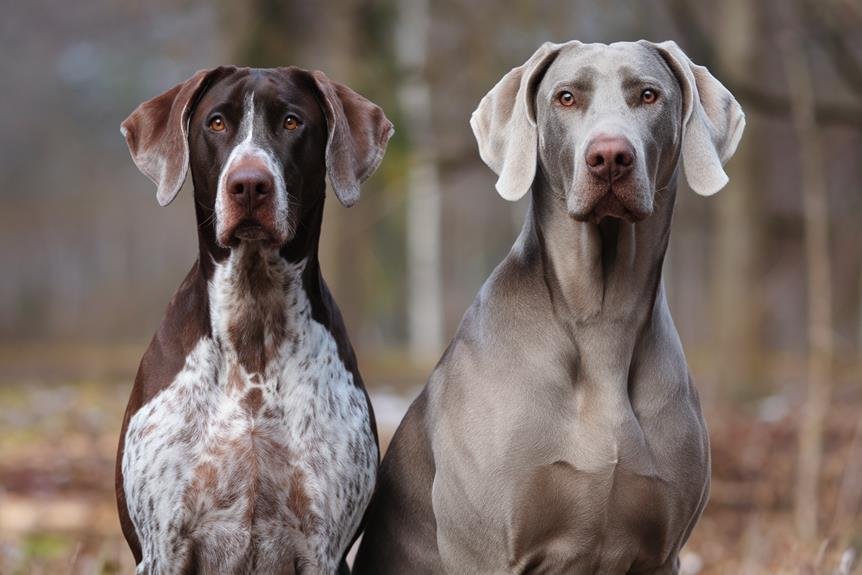
You’ll find the Weimaraner to be a fascinating breed with a complex personality and specific care requirements.
Let’s explore this elegant hunting dog’s temperament, training needs, health considerations, exercise requirements, and the types of households they’re best suited for.
Understanding these aspects will help you determine if a Weimaraner is the right fit for your lifestyle and family.
Weimaraner Personality & Temperament
What makes the Weimaraner’s personality stand out among other breeds? These elegant dogs are known for their friendly and fearless nature, coupled with a strong sense of loyalty to their families.
You’ll find that Weimaraners are more reserved and independent compared to some other breeds, which makes them excellent guard dogs when properly trained.
Their inquisitive nature can lead to some amusing situations. Don’t be surprised if your Weimaraner’s curiosity gets the better of them, sometimes resulting in clumsy moments due to their tall, lanky build. It’s all part of their charm!
One important aspect to consider is their tendency to experience separation anxiety. If you’re away from home for long periods, your Weimaraner might become distressed.
To keep them happy and well-adjusted, make sure to provide plenty of interactive play and social activities.
Early socialization and consistent training are key to raising a well-behaved Weimaraner. By exposing them to various environments and situations from a young age, you’ll help prevent behavioral issues and ensure they grow into adaptable, confident adults.
Weimaraner Training
With Weimaraners, training is both a challenge and a reward. These intelligent dogs require a firm and consistent approach to obedience training due to their independent nature. You’ll need to start early with socialization and structured training to prevent behavioral issues down the road.
Weimaraners are quick learners, but they can get distracted easily. To keep their interest, make training sessions engaging and interactive. Use positive reinforcement techniques and incorporate play into your obedience training routines. This will help maintain their focus and prevent boredom-induced stubbornness.
Consistent socialization is crucial for your Weimaraner. It’ll help them develop good behavior around new people and pets, reducing their tendency toward separation anxiety. Remember to make training fun and rewarding to keep your pup interested and motivated.
Don’t forget to include mental stimulation in your training regimen. Games and exercises that tap into their natural hunting instincts will keep your Weimaraner’s mind sharp and satisfied.
With patience and persistence, you’ll find that training your Weimaraner can be a fulfilling experience for both of you.
Weimaraner Health & Care
Generally, Weimaraners are robust dogs with a life expectancy of 10 to 13 years. To keep your Weimaraner healthy, you’ll need to schedule regular vet check-ups and stay on top of vaccinations.
These gray beauties have minimal grooming needs, but don’t skimp on dental care!
One health concern to watch out for is separation anxiety. Weimaraners thrive on companionship, so if you’re often away, they mightn’t be the best fit. Keep their minds busy with toys and puzzles when you’re not around.
Feeding your Weimaraner a balanced diet is crucial. Choose high-quality dog food to prevent obesity, as these pups can weigh up to 90 pounds. Remember, a chubby Weim isn’t a happy Weim!
Exercise is key to keeping your Weimaraner fit and content. Daily walks and playtime will help burn off energy and prevent destructive behavior. Think of it as a win-win: you’ll both stay in shape!
Weimaraner Exercise
If you’re considering a Weimaraner, be prepared for a high-energy companion that needs plenty of exercise. These dogs aren’t couch potatoes; they thrive on physical activity and mental stimulation. You’ll need to commit to at least 1 to 2 hours of vigorous exercise daily to keep your Weimaraner happy and healthy.
Weimaraners excel in activities that involve running and retrieving. They’re natural athletes and make good hunting dogs, so games like fetch are perfect for them. Long walks, jogs, and hikes are also great ways to burn off their energy.
Don’t forget about mental exercise, too! Puzzle toys and training sessions can help keep their minds sharp and prevent boredom-related behaviors.
These dogs love the outdoors and need space to run and explore. If you have a large, fenced yard, that’s ideal. But even if you don’t, you can still meet their exercise needs with regular outings to dog parks or open areas.
Weimaraner Suitable For:
Weimaraners are best suited for experienced dog owners who lead active lifestyles. These elegant German hunting dogs thrive in households with plenty of space and time for exercise.
If you’re considering a Weimaraner, please keep in mind that they need:
- A large backyard for running and playing
- Daily physical activity and mental stimulation
- Consistent training and socialization
- A dedicated owner who can provide attention and companionship
Weimaraner owners and enthusiasts often find that these dogs form strong bonds with one person, making them ideal for single-person households.
They’re not the best choice for families with small children or other pets, as they can be protective and may not tolerate rough play.
If you’re an active individual or couple looking for a loyal companion and potential guard dog, a Weimaraner might be perfect for you. They excel in homes where they can participate in activities like hiking, running, or swimming.
Keep in mind that these intelligent dogs need mental challenges as well as physical exercise to prevent boredom and destructive behavior.
With proper training and care, Weimaraners can be wonderful, devoted pets for the right owners.
Frequently Asked Questions
Is a Weimaraner the Right Dog for Me?
A Weimaraner might be right for you if you’re an experienced dog owner with an active lifestyle and plenty of space. You’ll need to provide consistent training, daily exercise, and companionship. They’re loyal but require significant time and attention.
Is a German Shorthaired Pointer Right for Me?
If you’re active, love the outdoors, and can provide plenty of exercise, a German Shorthaired Pointer might be perfect for you. They’re friendly, trainable, and great with families. Consider their high energy needs before deciding.
What Is the Difference Between a Weimaraner and a German Shorthaired Pointer?
You’ll find Weimaraners are larger and more reserved than German Shorthaired Pointers. GSPs are friendlier and need more exercise. They’re both versatile hunters, but GSPs range more widely. Weimaraners often bond closely with one person, while GSPs are sociable family dogs.
Is a Weimaraner Good for a First Dog?
You might want to reconsider a Weimaraner as your first dog. They’re challenging for novice owners due to their high energy, stubbornness, and need for extensive training. You’d be better off with a more manageable breed for your first canine companion.
Conclusion
When choosing between a German Shorthaired Pointer and a Weimaraner, you’ll need to consider your lifestyle and experience with dogs. Both breeds are energetic and require plenty of exercise, but GSPs are generally easier for first-time owners. Weimaraners need more experienced handling. Think about your living space, time for training, and ability to provide ample outdoor activities. Remember, both breeds make loyal companions for active families who can meet their needs. Whichever you choose, you’ll gain a devoted and lively friend.

